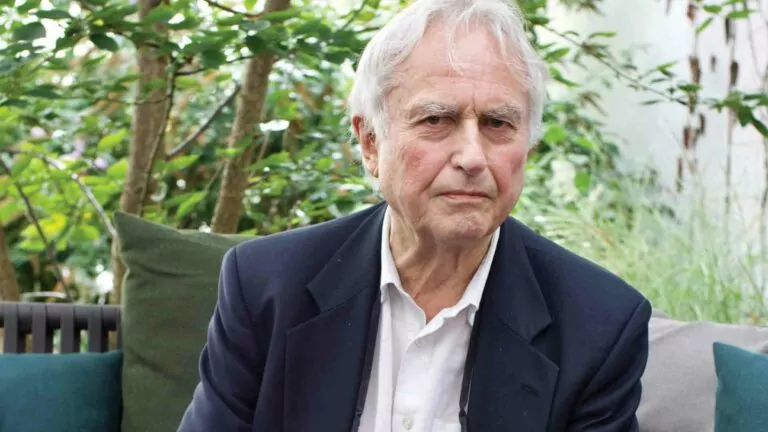In 2007, four now fairly famous atheists – Christopher Hitchens, Daniel Dennett, Sam Harris, and Richard Dawkins – met to discuss their views. They filmed the discussion, titled it “The Four Horseman,” and when it went viral, they became known as the “Four Horseman of New Atheism.” The name of their group was ironic, since they certainly had no interest in the book of Revelation, in which four horsemen bring God’s judgment on the rebellious world; however, it was also fitting, since the Four Horsemen of Revelation are destructive, as are the New Atheists.
Even they seemed to understand the destructive nature of their godless stance. Daniel Dennett saw Darwinism’s Dangerous Idea (the title of his 1995 book) as “a universal acid” that would eat through whatever it came into contact with. The despair of our current culture supports that, though in a way that Dennett did not intend.
Cultural Christian?
Of these “horsemen” the most famous today is Richard Dawkins, who is best known for his book The God Delusion. His prominence is partly because he is one of only two still living: Christopher Hitchens died in 2011, and Daniel Dennett died just this past April.
But Dawkins’ fame is also because he has repeatedly made news for embracing aspects of the very Christianity he’s made his name attacking. And God has allowed Dawkins to live long enough to see some of the impact of his own form of atheistic evangelism, so that the lead horseman could begin to understand the destructiveness of his godless stance.
This past year, in an interview with journalist Rachel Johnson, Dawkins declared that he “was slightly horrified to hear that Ramadan was being promoted instead” of Easter, because:
“[the United Kingdom is] culturally a Christian country. I call myself a cultural Christian. I’m not a believer.”
Dawkins noted that “there is a distinction between being a believing Christian and being a cultural Christian.” But as British evangelist Glen Scrivener noted, Dawkins has maintained his “cultural” Christianity for quite a while now. Dawkins offered to read a chapter of the King James Bible for the Bible Society during the 400-year anniversary of the publication of the KJV back in 2011. Dawkins wasn’t paying tribute to the truth of God’s Word – he was only expressing a “historical interest” in the KJV, equating it to a similar appreciation for Richard Wagner and the Greek gods, since all three give us a better understanding of English literature. He also said that “it is important that religion should not be allowed to hijack this cultural resource.”
Scrivener also noted that in 2018, Dawkins tweeted a picture of himself with the following caption:
“Listening to the lovely bells of Winchester, one of our great mediaeval cathedrals. So much nicer than the aggressive-sounding ‘Allahu Akhbar.’ Or is that just my cultural upbringing speaking?”
Dawkins was more pointed in his 2024 interview with Rachel Johnson. He said:
“I love hymns and Christmas carols. I sort of feel at home in the Christian ethos. I feel that we are a Christian country in that sense,”
And later in the interview he added: “Christianity is a fundamentally decent religion.” Comparing the treatment of women and homosexuals in both religions, Dawkins admitted that Christianity’s treatment of all people, whatever their sex or sin, is fundamentally more decent than that of Islam. But he still cannot, or will not, acknowledge why it is more decent. And that why is rooted in Christianity’s working out of the truth of Genesis 1: that all people are created in the image of God.
There is no fruit without the root
Glenn Scrivener makes a great point about Dawkins’ inconsistent positions: he said that Dawkins is like the birds pecking at the seeds of the gospel in Jesus’ Parable of the Sower (Matt. 13:1-8). You can see such pecking in his Easter conversation with Rachel Johnson. He kept pecking at her own limited faith, asking, repeatedly, whether she herself believed in the virgin birth or the resurrection of Jesus Christ (she could only reply that she’d like to believe it).
Scrivener says that Dawkins wants the fruits of Christianity without the root that brought it into being. He makes a connection to a later parable in the same chapter: the Parable of the Mustard Seed where a giant tree grew out of a small seed (Matt. 13:31-32), and suggests that Dawkins is one of the birds that is allowed to perch in the branches, enjoying the earthly fruits of God’s kingdom, even while he saws at the root of the tree.
Every knee shall bow (Phil. 2:10)
So what is the good news in Dawkins’ claims of cultural Christianity, even as he continues to deny the objective truth of Christianity? Let’s go back to the first Horseman we looked at: Daniel Dennett, who saw evolution – Darwin’s dangerous idea – as the acid that would transform everything it came into contact with. Dawkins has been admitting the terrible truth of Dennett’s boast. Evolution’s attack on the root of Christianity has left the West vulnerable to false gods, like Allah and trans ideology – two things that horrify Dawkins.
Dawkins’ confused, but stubborn and hostile, attitude toward Christ shows the truth of Galatians 6:7-8:
“Do not be deceived: God is not mocked, for whatever one sows, that will he also reap. For the one who sows to his own flesh will from the flesh reap corruption, but the one who sows to the Spirit will from the Spirit reap eternal life.”
And some people have, unexpectedly, been brought by the Spirit to begin sowing to the Spirit. For instance, Ayaan Hirsi Ali, who first embraced atheism in her rejection of her Muslim upbringing, has seen, like Dawkins, how the New Atheism helped open up the West to destructive gods, and how atheism had nothing to counter them. She has been brought to acknowledge both the fruit and the root of Christianity – Christ himself – and in a conversation with Dawkins, opened him up to at least admit that the existence of God is “a dramatic important idea.”
The good news is that the lead horseman has to acknowledge that what he and his friends have been sowing – the wind – is reaping the whirlwind. Even better, that whirlwind is preparing some to be blown over by the wind of the Spirit that Jesus tells Nicodemus about (John 3:8). In that way, willingly or unwillingly, they already have to fulfill the truth of Philippians 2:10, and bend the knee before the King.












